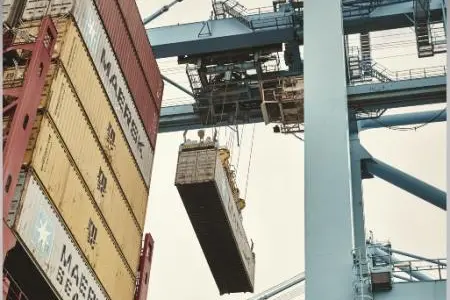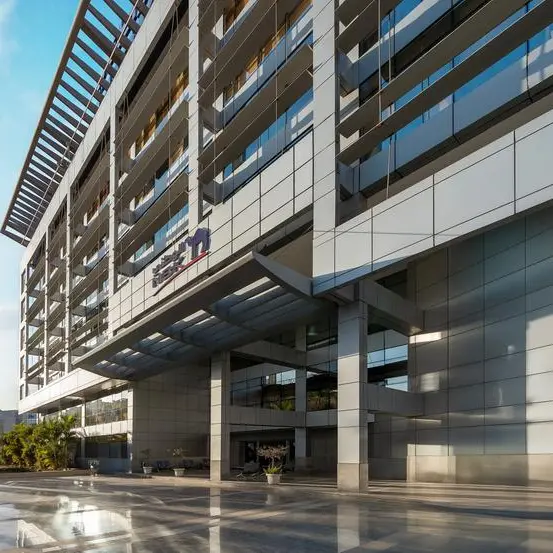PHOTO
Saudi Customs witnessed the arrival of the first shipment powered the blockchain technology. The cargo departed Dammam Port in Saudi Arabia bound for Rotterdam while its data and documents were handled by all parties to the shipment on a national single window, FASAH.
This is the second milestone within the pilot program launched by customs last year, in collaboration with TradeLens, aiming to transform the shipping industry in the region to become faster, more transparent and efficient in its real-time operations.
TradeLens, co-developed by Maersk and IBM, uses blockchain technology as the foundation for digitizing supply chains, enabling increased industry innovation, reduced trade friction and, ultimately, increased global trade. The platform-based solution is empowering multiple trading partners to collaborate by establishing a single shared view of a transaction and its related documents without compromising details, privacy or confidentiality.
“To establish the Kingdom as one of the world’s premier logistics hub we needed to create a paradigm shift in the way we handle our shipping processes and explore futuristic approaches with our peer-to-peer business ecosystem worldwide. We hope our pilot program will stand the test of time to include other ports as well, and not just the route of exporting, but importing also. We chose to embark on this tech journey knowing that change is uncomfortable, but it is inevitable to be a leading global player,” said H.E Mr. Ahmed Al-Hakbani, Governor of Saudi Customs.
“TradeLens offers an opportunity of collaboration and commitment among all stakeholders by building trust through a model that benefits all parties,” said Mohammad Shihab, managing director of Maersk Saudi Arabia. “We are excited for Saudi Customs to pioneer the use of the platform and shape the transformation of the business processes in the region.”
The first TradeLens pilot project in the Middle East showcases the capabilities of blockchain technology as an alternative to the traditional paper document flows in international trade. By replicating digital documents across multiple supply chain participants, the goal is to identify potential improvements to the export and import processes.
How it works
In this pilot, the container gated into Dammam Terminal on 27 March. The commercial invoice and packing list were uploaded by the customer to the TradeLens platform in a structured format, with their export customs broker using the data in these documents to submit export declaration to Saudi customs. The shipment’s information was then accessed and used by Saudi Customs to register the clearance.
The container was loaded onboard Maersk Sebarok, transshipped in the Port of Tangier and then headed to Rotterdam, where Dutch Port Community System Portbase provided the Dutch customs release messages and gate-out information directly to the TradeLens platform. Next the container was transported by truck to a location close to Antwerp, Belgium and its final destination.
The shipment was monitored in the TradeLens platform for key shipment events and document milestones. Using blockchain-backed structured documentation, data from the shipment’s documents were analyzed by both the export and import customs authorities and the cargo owners via the platform.
-Ends-
About Saudi Customs
Saudi Customs is the official body mandated to manage the movement of trade and travelers crossing Saudi Arabia’s land, sea, and air ports; Saudi Customs’ mission is to contribute in motivating the economy and empowering the Kingdom to become a global logistics hub through effective and efficient trade facilitation, revenue realization, customer care, and society’s security and protection.
About TradeLens
The TradeLens platform has been jointly developed by Maersk and IBM. TradeLens is an open and neutral industry platform underpinned by blockchain technology, supported by major players across the global shipping industry. The platform promotes the efficient, transparent and secure exchange of information in order to foster greater collaboration and trust across the global supply chain.
Disclaimer: The contents of this press release was provided from an external third party provider. This website is not responsible for, and does not control, such external content. This content is provided on an “as is” and “as available” basis and has not been edited in any way. Neither this website nor our affiliates guarantee the accuracy of or endorse the views or opinions expressed in this press release.
The press release is provided for informational purposes only. The content does not provide tax, legal or investment advice or opinion regarding the suitability, value or profitability of any particular security, portfolio or investment strategy. Neither this website nor our affiliates shall be liable for any errors or inaccuracies in the content, or for any actions taken by you in reliance thereon. You expressly agree that your use of the information within this article is at your sole risk.
To the fullest extent permitted by applicable law, this website, its parent company, its subsidiaries, its affiliates and the respective shareholders, directors, officers, employees, agents, advertisers, content providers and licensors will not be liable (jointly or severally) to you for any direct, indirect, consequential, special, incidental, punitive or exemplary damages, including without limitation, lost profits, lost savings and lost revenues, whether in negligence, tort, contract or any other theory of liability, even if the parties have been advised of the possibility or could have foreseen any such damages.




















